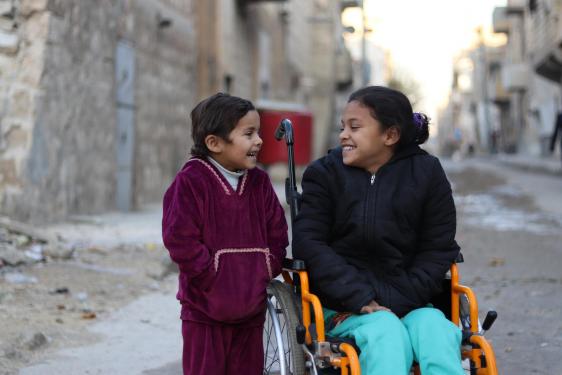Monthly Newsletter | Issue 11 - July 2021

Reference Group on Inclusion of Persons with Disabilities in Humanitarian Action
Welcome to the 11th edition of the DRG Newsletter!
We are sharing with you several important reports and guidance documents from the humanitarian system which include substantial content on persons with disabilities, highlighting the increasing attention to disability inclusion. For example, the Central Emergency Response Fund (CERF) has identified persons with disabilities as one of four ‘under-funded priority areas’ and reflected this accordingly in its annual report. While we need to continue working collaboratively to advance on the rights of persons with disabilities impacted by humanitarian emergencies, this edition of the DRG newsletter reminds us how much progress has been made due to the commitment ad joint efforts of many.
Elham Youssefian (International Disability Alliance), Christian Modino Hok (CBM Global) and Kirstin Lange (UNICEF)
Photo Credits: UNICEF/UN0177789/Al-Issa
IASC Guidance on Strengthening Participation, Representation and Leadership of Local and National Actors in IASC Humanitarian Coordination Mechanisms
The recently endorsed IASC Guidance on Strengthening Participation, Representation and Leadership of Local and National Actors in IASC Humanitarian Coordination Mechanisms aims to support efforts to strengthen the meaningful participation, representation, and leadership of local and national humanitarian actors (L/NAs) within IASC humanitarian coordination structures. It draws on over 100 pieces of research and good practice to provide recommendations on how L/NAs can be an integral part of humanitarian coordination structures. Engagement of OPDs is addressed throughout the document. We encourage you to share this document within your organizations.
Please contact Ali Gokpinar gokpinar [at] un.org () with copy to iasccorrespondence [at] un.org () should you have any questions.
-->
2020 Central Emergency Response Fund (CERF) Annual Results Report from OCHA
Please find the 2020 Central Emergency Response Fund (CERF) Annual Results Report, which highlights how CERF responded to the dramatic increase in humanitarian needs with the disbursement of a record-breaking $848 million to support humanitarian action in 59 countries and territories. The report includes a sub-section on how persons with disabilities, as one of four priority under-funded areas, were reached by CERF funding. Persons with disabilities are also referenced throughout the report.
The year 2020 showed the need for an emergency fund ‘for all, by all’ that enables swift humanitarian action to save lives and protect people in crisis globally. Beyond the COVID-19 pandemic, CERF again demonstrated the difference that it makes to the lives of people caught in humanitarian crises across the world as a record number of crisis-affected people – 69.3 million – received CERF-funded humanitarian assistance in 2020.
-->
Inclusion Strategy and Roadmap: Outcomes from the Inclusion Priority Topic at the 2021 HNPW
On 5 May 2021, Humanitarian Policy Group (HPG) hosted the HNPW outcome session Inclusion strategy and roadmap: ‘building the bridge’ between the status quo and the goal to be achieved. This learning note provides highlights from the outcome session, as well as a brief overview of the 15 inclusion- related sessions during the 2021 HNPW. After outlining the remaining gaps and challenges to making humanitarian action more inclusive for marginalised people, it identifies possible opportunities and ways forward.
Please find the learning note HERE.
-->
Second Global Survey on OPD Participation in Programmes and Policies
This is a chance to voice your opinion about your engagement with governments and international partners. It can be completed by all members, volunteers and staff members of OPDs. The survey is individual, and it can be completed by more than one person per OPD.
This Survey is hosted on a new accessible online survey called iData platform which includes accessible features such as read-aloud, activating videos in International Sign, changing contrast or font size, getting word definitions.
The survey is available in: English, Arabic, Chinese, French, Russian, Spanish, German or International Sign. It will take approximately 20 minutes to complete it.Please help disseminate the IDA Global Survey sharing it with your network and through social media. Use the hashtag #IDAGlobalSurvey. You can also use the social media kit and videos available HERE.
-->
Call for Expressions of Interest for Sign Language Use and Development Analysis in Iraq
Open to individual/teams of consultants and researchers/public institutions and organisations/university and research centers/national and international organisations. More information including full EoI can be found at https://iraq.iom.int/jobs
-->
Job Opportunities
